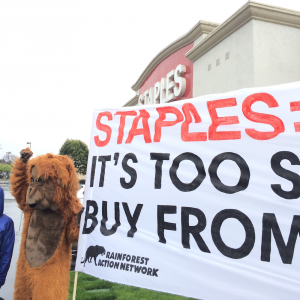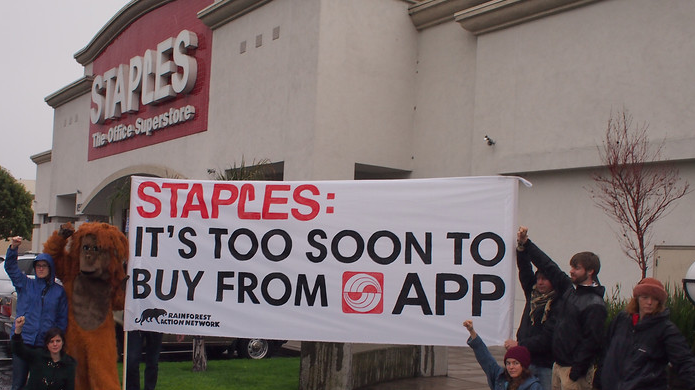 Activists with Rainforest Action Network staged a direct communication today at office-supply giant Staples. Displaying a banner that read, “Staples: It’s Too Soon to Buy from APP,” a group of activists voiced their opposition to the company’s recent decision to resume purchasing paper from Asia Pulp and Paper (APP).
Activists with Rainforest Action Network staged a direct communication today at office-supply giant Staples. Displaying a banner that read, “Staples: It’s Too Soon to Buy from APP,” a group of activists voiced their opposition to the company’s recent decision to resume purchasing paper from Asia Pulp and Paper (APP).
One of Indonesia’s most notorious deforesters, APP’s history of broken promises, rainforest destruction and human rights abuses in Indonesia is well documented and extends across an area almost the size of Massachusetts.
After numerous contract cancellations from major customers over APP’s ties to deforestation and land grabs, the company issued a Forest Conservation Policy (FCP) in February 2013 promising broad reforms and a halt to further rainforest destruction.
To its credit, APP has extended a moratorium on further rainforest clearing and conversion across all of its concessions and those of its suppliers.  But APP is still in the early stages of implementing the environmental and social commitments in its Forest Conservation Policy (FCP). And though an auditor has been agreed on, there has been no independent verification of APP’s performance in implementing the FCP.
But APP is still in the early stages of implementing the environmental and social commitments in its Forest Conservation Policy (FCP). And though an auditor has been agreed on, there has been no independent verification of APP’s performance in implementing the FCP.
Furthermore, APP has yet to develop credible plans for addressing key gaps in the FCP—for example, on restoring some of the extensive landscapes it has devastated—which have been summarized in the Environmental Paper Network’s “Performance Targets and Milestones for APP” endorsed by Greenpeace, WWF, RAN and Indonesian NGO WBH, among others.
Based on past experience, RAN maintains that companies are more motivated to undertake robust implementation of commitments if rewarding such implementation comes after, not before, it is carried out and independently verified.
Although Staples is jumping the gun by purchasing from APP, the circumstances could be far worse. Staples has put in place environmental and social performance requirements as part of its contract with APP. It’s also starting small and phasing its purchases. Those safeguards are something that all paper purchasers should require after APP’s FCP has been fully implemented and verified. This conditional purchasing reflects a strategic approach, but still leaves Staples open to risk of APP defaulting on its commitments.
Finally, Staples and all paper buyers must not let the fact that APP is undertaking reforms undermine or replace their purchases of recycled and FSC certified paper and wood products. Contractual requirements and verification of performance on APP’s Forest Conservation Policy are not equivalent to the comprehensive, multi-stakeholder agreed standards and accredited verification apparatus that underpin FSC certification.
While we remain optimistic that APP’s commitments will be fully implemented, at the moment it is simply too early to tell, and too early to buy. 